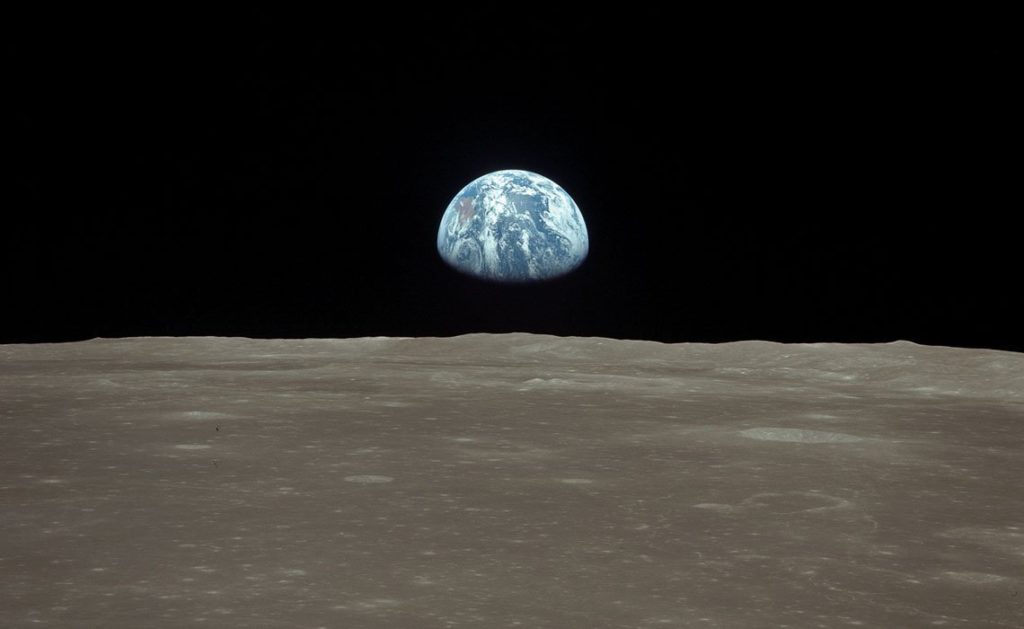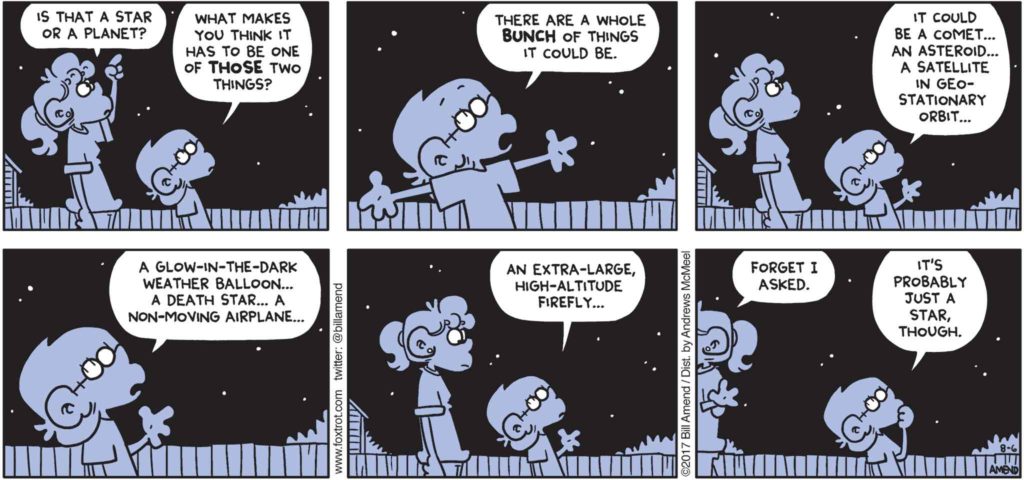
A cosmic perspective makes us aware that our planet is part of an incomprehensibly large universe. The result is a humbling realization that can inspire a wonder and awe that allows us to connect to something bigger than ourselves. While it may not seem useful in dealing with our daily responsibilities, the truth is that we can benefit from this viewpoint in several ways. (Estimated reading time: 7 minutes)
“Embracing cosmic realities can give us a more enlightened view of human life.”
— Neil deGrasse Tyson
While working on the moon’s surface during the Apollo 14 Mission in 1971, astronaut Edgar Mitchell experienced what he described as an intense spiritual epiphany. On spotting Earth, he said:
“Suddenly, from behind the rim of the Moon, in long, slow-motion moments of immense majesty, there emerges a sparkling blue and white jewel, a light, delicate sky-blue sphere laced with slowly swirling veils of white, rising gradually like a small pearl in a thick sea of black mystery. It takes more than a moment to fully realize this is Earth . . . home.”
Seeing Earth from that vantage point was a “glimpse of divinity,” according to Mitchell. It transformed his consciousness and sowed the seeds of his interest in understanding the mysteries of life and investigating subjects like telepathy and extrasensory perception.
Upon returning home, he set forth to find out exactly what happened to him during his journey in outer space. With degrees in aeronautics and astronautics, he knew that science would not be able to explain the highly visceral feeling that was unlike anything he had ever known.

After delving into books and speaking with experts in the field of spirituality, anthropology, and theology, he finally found a word to describe his awakening in deep space: “samadhi”.
Samadhi is an ancient Sanskrit word from Hindu scriptures that means, “seeing things internally as a unity and oneness accompanied by feelings of ecstasy.” Other astronauts told Mitchell that they, too, felt a sense of the interconnectedness of all things while they were in space.
Mitchell was the first in his profession to notice it and name it. He was also the first to champion the benefits of taking on a cosmic perspective and encouraged others to develop one.
Cosmic consciousness: Seeing beyond the horizon
Those who have been to space will tell you that it’s almost impossible to explain what it’s like to look back toward Earth. What they can share is the life-changing effect of this cosmic wake-up call and how it reshaped their identity and approach to life.
Not all of us will be able to see our planet from outer space, but that doesn’t mean that we can’t experience a similar sense of awe and wonder from celestial encounters.
We get glimpses of our planet, solar system, and universe by visiting planetariums, stargazing in our backyards, observing astronomical phenomena such as eclipses and meteor showers, and following NASA and other space-oriented organizations on social media.
The sense of awe these experiences evoke has been deemed the “Overview Effect,” a phrase coined by Frank White. The overview effect is a cognitive shift in awareness and perception that makes us aware of how fragile and small the Earth is.

The fact that we live on a tiny pale blue dot that’s part of an incomprehensibly large universe is a humbling realization that can inspire wonderment and awe. If we can harness the emotions it sparks within us, we can feel more connected to something bigger than ourselves.
We can see ourselves as space travelers, part of a universal family with a role play, no matter how small. Earth becomes a sacred, living entity that we’re in communion with every day.
We will begin seeing everything that happens within and around us through a cosmic lens. By doing so, we co-create our reality with these larger forces.
We’re not the center of the Universe: Going beyond the ego
Our planet is a tiny speck floating in the void of interplanetary space. The sun is one of a hundred billion other stars in the Milky Way galaxy. Our galaxy is one of 50-100 billion other galaxies in the universe. Does this reality make you feel small or enlightened?
Most of our ancestors felt threatened by the possibility that Earth was not the center of the universe. Anyone who hinted at anything other than the accepted wisdom were seen as heretics and faced a grim fate. The tension between the immensity of the universe and the human ego was real.
Polish scientist, Nicolas Copernicus, lived in a time when everyone believed in geocentrism—the view that the Earth lies at the center of the universe. Fearing persecution from the Catholic Church during the Reformation, he kept his heliocentric theory a secret and didn’t make it public until he was on his deathbed in 1543.
90 years later, the church convicted Galileo Galilei for supporting Copernicus’s theory of heliocentrism and placed him in life-long house arrest.
Over the years, as scientific reasoning became more prominent, we embraced our place in the universe, but traces of resistance still exist in the human psyche. Those who have it don’t realize how this myopic view can diminish their sense of power.

Astrophysicist, Neil deGrasse Tyson, says that if learning and being exposed to a cosmic perspective depresses us, that means that we started our day with “an unjustifiable large ego.” If that’s the case, he says that we should do everything we can to reject that ego.
“Sit back and bask in your relevance to the cosmos. When I look up in the universe I know I’m small but I’m also big. I’m big because I’m connected to the universe and the universe is connected to me,” he says. Instead of being minimized by the immensity, we’re empowered.
Shedding the superficial layer of the ego to reach the heightened awareness that characterizes a cosmic consciousness requires us to stay open to other ways of being.
In 1901, psychiatrist Richard Maurice Bucke defined three levels of consciousness in his book, “Cosmic Consciousness”:
- Simple consciousness: a basic awareness that both mankind and animals possess.
- Self-consciousness: an awareness that involves thought, imagination, and reason.
- Cosmic consciousness: a higher and more spiritual awareness that most people don’t possess.
According to Bucke, attaining cosmic consciousness requires an understanding of eternal life, the whole universe, and the interconnectedness of every living entity.
You don’t have to meditate for hours or retreat from the world to attain a cosmic perspective. By adopting simple practices and mindsets, we can take our level of being to the next level.
Out of this world: Benefits of a cosmic perspective
Not everyone can spend time musing on the cosmic view of life. For the struggling artist trying to make ends meet, or the homeless person rummaging through trash to find an edible morsel of food, pondering on existential truths is a luxury.

Even citizens in industrialized countries need the right conditions to take on this perspective. A child raised in a school system, government, or family that inspires them to understand their place in the universe is more likely to see life through a wider lens.
I’m fortunate to have had a father who falls into this category. An avid learner, he always had the National Geographic or Discovery Channel playing in the background.
When I was in college, he handed me the DVD box set of “Cosmos: A Personal Voyage,” a thirteen-part 1980 television series written by astrophysicist Carl Sagan. He said, “Watch this. It will change you for life.”
He proved to be right. What I loved most about Sagan’s narrative was his ability to intertwine the study of the cosmos with spirituality. According to Sagan, science is not only compatible with spirituality, but it is a profound source of it, similar to the idea suggested by Mitchell.
On the surface, these spiritual insights may not seem useful in dealing with our Earthly problems and responsibilities but that couldn’t be further from the truth. There are several benefits to gaining a cosmic perspective. Here are five of them:
1. You’ll get away from the mundane: Learning more about the infinite nature of the cosmos helps us experience an expanded reality beyond our regular 9 to 5 schedule. When we see ourselves as living in a vast Universe, our paradigm of existence shifts.
2. You’ll be inspired to ask the big questions: A cosmic perspective will make us ask bigger questions like: How was the universe created? Why are we here? Where did we come from? Is there other intelligent life out there? If there are, what are they like?
3. You’ll gain perspective on your worries: Sometimes, we get mired in our challenges. While a practical, down-to-Earth strategy is essential to deal with them, the respite a big picture perspective offers may be just what we need to calm our nerves and take the long view.
4. You’ll see the Earth as one big family: The biggest cause of conflict between nations has been the result of an “us versus them” mentality. An ego-driven identification with one’s country or race causes mistrust, fear, and hate. A cosmic lens can lead us to embrace our differences.
5. You’ll feel a deeper sense of responsibility towards the planet: Seeing our planet in all its glory will make us value and cherish it more. A home as beautiful, lush, and bountiful as ours needs us to care and preserve its treasures.
As you develop a deeper link with the cosmos, you’ll begin to feel a connection with something larger than yourself. You’ll experience the universe as intelligent, loving, and harmonious, and you’ll feel supported by its high vibrations.
All my best on your journey,
Seline

Question for you: What does having a cosmic perspective mean to you? How do you think it will benefit you in dealing with challenges?
Did you like this post? Sign up below, and I’ll send you more awesome posts like this every week.

Have Your Say